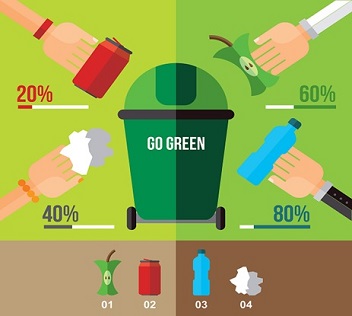
Did you know the cost of the food wasted differs at different levels of the food consumption process? Therefore, the monetary value of wasted food further increases as it goes through the various phases, right from acquiring the produce to when it is finally served to you. This shows that when you waste even a small portion of your food, you are also wasting the resources it took to produce the food. This makes it even more crucial for commercial organizations that produce or retail food on a regular basis to carefully analyze their current consumption and make changes to reduce the same. Let us look at some ways through which such companies can curb wastage of food by embracing the “Reduce, Reuse, Recycle” motto.
The first step is to quantify the waste generated in order to access critical areas and find alternatives to prevent the same. Once you have understood the various areas and causes of such wastage, you can then plan your food/produce requirements and purchase the same accordingly.
Accurate Ordering—You can set up a stock-order form which will ensure you only buy the exact quantity of food required. This also prevents over ordering and subsequent spoilage of food due to non-use. Additionally, it automatically promotes use of fresher produce which is beneficial in terms of quality in the eyes of your customers.
Careful Inspection of Deliveries—You must always ensure the produce delivered is to the quality expected, free of any contamination and as per your requirements. If not, return the product and immediately send feedback to your supplier, who can make the required changes so that wastage due to quality control benchmarks isn’t repeated.
 Order Locally—Wherever possible try to source your produce from local suppliers. This reduces wastage and spoilage of food due to transportation while ensuring fresh produce. This also has cost benefits as you can cut down on transportation and import costs.
Order Locally—Wherever possible try to source your produce from local suppliers. This reduces wastage and spoilage of food due to transportation while ensuring fresh produce. This also has cost benefits as you can cut down on transportation and import costs.
Optimize Handling of Best Before Dates—Both retailers and food producers like restaurants and hotels can reduce wastage by carefully keeping track of the expiration dates. This will help them plan special offers such as clearance sales well in time (in case of retailers) and special menus and cuisine themes (in case of restaurants/hotels/food catering businesses).
Reuse and Recycle Whenever Possible—In case of leftovers, you can always donate the food to charity or other such avenues. You can even organize special drives that feed the homeless or even animals, depending on the type of food at hand. Another method that has proven helpful is waste compaction. By using trash compactors and macerators, you can reduce the overall quantity of waste generated, thereby reducing the amount of waste that ends up in landfills from your end.
These days, many hotels are employing innovative techniques of reducing waste. While some are going back to analyzing the source of the wastage, others are collaborating with various agencies that battle such environmental issues to combat the problem of food waste. Let us take a look at some companies that are leading by example:
- The Accor Hotels, which includes the Pullman, Sofitel, Novotel, Mercure and Ibis chains, intends to “reduce food waste by 30 percent, in particular by sourcing food locally,” according to Chief Executive Sebastien Bazin. The French group, which generates 25 percent to 30 percent of its revenue by serving 150 million meals a year, will first work out how much food it is wasting. Its restaurants will be required to weigh and record food that is thrown away in order to best determine how to cut waste.
- Fairmont Hotels and Resorts is another brand that works to reduce food waste. The kitchen brigade at Fairmont Jasper Park Lodge has partnered with Twin Meadows Organics Farm, a sustainable and organic family farm that delivers local produce. The Fairmont team provides the waste vegetable oil back to the farm to fuel the delivery truck and on-farm generator. In fact in Vancouver, the Fairmont Waterfront is working toward being a zero-waste hotel. Zero waste means 90 percent of all waste (including food waste) will be diverted from landfill, as certified by Recycle Smart. In addition to the hotel’s 2,100 square foot rooftop garden, the kitchen team has created a vertical garden that composts the kitchen’s food waste on-site and uses it to fertilize plants. The vertical garden supports 100 plants in less than one square meter of space. The remaining amount, some 1,000 kilograms of food waste, is collected from the hotel by an outsourced company, is sterilized and then turned into fertilizer.
- New York’s Millennium Hilton regularly utilizes a food digester, and the hotel diverts about 7 tons of hotel restaurant organic waste from landfill per month, which results in a cost savings of approximately 18 percent per month.
- The Hyatt Regency Princeton in New Jersey is another example of a hotel that is working against food wastage. In 2009, the hotel was able to save over $10,000 by having 131 tons of food scraps composted instead of sending it to the landfill. Further analyzing those numbers, $7,600 was from keeping the food out of the trash and the remaining $2,400 was saved from reducing the number of trash compactor pulls. In the kitchen, the Hyatt Regency also began storing leftover cooking grease, selling it off to Mopac, a company responsible for recycling it for animal feed.
As you can see, there are multiple ways to combat and solve the problem of food waste. It begins at ensuring the difference between the demand and supply for food is negligible. This will automatically lower the potential for waste. Once that is taken care off, such outlets can then find the best and most suitable way of disposing their food waste in order to reduce the amount that ends up in landfills. As they say, acceptance of the problem is the first step to change, the rest will follow. So, start today to make tomorrow better!
Erich Lawson is passionate about saving the environment through effective recycling. He has written a wide array of articles on how modern recycling equipment can be used by industries to reduce monthly garbage bills and increase recycling revenue. You can learn more about environment savings techniques by visiting the Northern California Compactors, Inc. blog.






Nice post and awesome simple tips given to reduce food waste. Thanks for sharing.